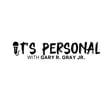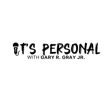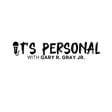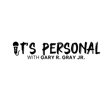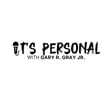Become a Creator today!Start creating today - Share your story with the world!
Start for free
00:00:00
00:00:01

#ItsPersonal III 87. Dr. Sonja Cherry Paul shares education, daughter love and book recommendations!
I am not really sure what Dr. Sonja Cherry Paul can't do. I mean, not only is she an amazing person, she really has an awesome story and provides so much to the world.
Her work focuses on anti-bias and anti-racist pedagogy. She develops a curriculum (Heinemann) for educators and schools. She's co-founder/facilitator of Institue for Racal Equity in Literacy and is currently working on an adaptation for Stamped for kids (and so much more)
In this podcast, you will listen to Dr. Sonja talk about her life growing up in Brooklyn, why she decided to focus on education, book recommendations, and how she keeps a special daughter-mother relationship.
Website: https://www.sonjacherrypaul.com/
Twitter: https://twitter.com/SonjaCherryPaul
Transcript
Introduction and Guest Appearances
00:00:00
Speaker
Welcome back, everyone, to another episode of It's Personal. The last book I wrote is heavy. All right. Hey, Gary. This is DVD to boy. My name is Randy Rebine. My name is Jared Krizovska. I don't think I'm a person that curses a little heart and just comes out to entertain me. I'm excited. Hi. I'm seeing how she's doing today. Can you introduce yourself?
00:00:24
Speaker
Yes, I'm Sonia Cherry-Paul. I'm so happy to be here and to be in conversation with you, Gary.
00:00:30
Speaker
You forgot the dot. Where's the dot? You can say doctor. Like, I think that's okay. You need to put that stamp on. Okay, Gary. I'm Dr. Sonya Cherry-Paul and I'm so happy to be here. Sounds better. Oh, gosh. You are truly like family. They're like, no, you got to put the bling on that. You do. Everyone else does. You earn that. You earn that.
The Importance of Titles and Identity
00:00:57
Speaker
And I think
00:00:58
Speaker
I love showing off friends that have done the work and are in the mud, doing all that stuff. I think it's so important. I really think it's so important. And I don't know what your journey is on that, but I hope that you feel more comfortable as years go on that you own that. Because again, it is yours now. People can't take that away from you.
00:01:24
Speaker
It's it's it is true and it's so true when you're with black and brown folks. They want that doctor in front of your name, they, they always refer to me in that way and I keep saying, I'll say to folks, it's okay to just say so and they're like no.
00:01:40
Speaker
Oh, no. And I get it. It means something to us in a way that I think is different to white folks. I work with people who have doctorates and they don't use that in their title. But what I don't think they always understand is that it is important for Black folks to use that title in lots of different ways and for other Black folks to see us use that title. So I do get it. I agree.
00:02:10
Speaker
Yeah, I have my first black principle this year.
00:02:14
Speaker
in an international school, which is like very rare. And she's female on top of that, which is like so special to me for so many reasons. And she's a doctor as well. So I, in the same way with her, like, I think you need to stamp it. It's just great. Sonya, can you, I'm so, I have so many questions for you and we talk a little bit about it early, but I want to just check in. I want to just,
00:02:42
Speaker
see how things are going, all things considerate. Just yeah, can you give us a brief rundown of how life has been just so far?
Pandemic Challenges and Personal Reflections
00:02:53
Speaker
So life has been, you know, chaotic. It's been exhausting. It's been frustrating. And even though I'm using all of those words, I can say that, you know, even
00:03:11
Speaker
talking with you today, among all of the things that are happening, I am blessed, right? But this pandemic has certainly touched my family in ways that have been incredibly challenging from, you know, my dad getting COVID last year, right at the start of the pandemic. And it took him months and months and months to battle it. And I'm very
00:03:41
Speaker
I'm very grateful that he survived this only for us to lose, you know, my uncle, his youngest brother last month. And, you know, my father is the patriarch of the family and he's trying to understand how he could survive it, but his little brother couldn't be saved. There's no rhyme or reason that makes sense. And the loss is
00:04:07
Speaker
It's challenging when we can't gather, right? Black people like to come together, whether it's in times of celebration or times of grief. And how do you breathe when you can't gather? It's very challenging. You know, I have an aunt that's ill right now and is in the hospital and so
00:04:31
Speaker
Um, it's tough. I've always been someone who spends a lot of time with my, my elders. I always have, even as a young person. Um, and so I, um, I'm worried. I'm worried. I'm hoping that we are at the end of this pandemic and I'm hoping that the rest of my family can stay safe. Yeah. Yeah. And then there's everything going on in the world that, you know. Of course.
00:04:59
Speaker
makes it challenging. Yeah, it does. And I mentioned it before, Sonja, but I wanted to again, let you know that I definitely see you and I'm thinking about you as someone who has built somewhat of a relationship with you just based online and just like seeing you at NCTE. Yeah, I am thinking about you and hoping things go well. And I want to again, remind you that it's okay that we
00:05:25
Speaker
are angry and frustrated and upset and cry and all those things because those things are normal, right? Those things are normal. Yes. Sonya, we're going to go back just a little bit because I'm so curious about your past and your future, which is like, from what I see and what I hear, it just continues to blow my mind in regards to the work that you're doing and getting into.
00:05:52
Speaker
So how did you get into education? Like, how did that happen for you?
Career Transition: Music to Education
00:05:57
Speaker
Well, it's interesting, Gary. It's a story that I don't think a lot of people know about, but I actually started in the music industry.
00:06:07
Speaker
Yes, I graduated with a degree in music business and I worked at Polygram Records and I worked for an off-Broadway production company and I really thought my life was going to be in the music industry.
00:06:26
Speaker
And then my husband and I got married. We were young. And next thing you knew, we were starting a family. And that was not planned. That was a beautiful blessing and a surprise. And things had to change. You can't be out in those streets at 11 o'clock at night with a baby.
00:06:49
Speaker
So I left that part of my career and had a baby and had to figure out what is it that I want to do? What do I want to be in the world? And I was just madly in love with this baby. I mean, I just thought everything she did was magical. And I thought about the words of my grandfather. He always told me that I was going to be a teacher.
00:07:18
Speaker
He would tell everybody, my parents, he told me, Sonia is going to be a teacher. So I thought, let me go back to school. Let me go to school and try this on. And that's really how that worked, Gary. I went back, got my first master's degree in education, fell in love with teaching. And yeah, so that's how that all started.
00:07:46
Speaker
Black people are so versatile. It is unbelievable. I had no idea, obviously, but I love that. I think there is a huge connection between music and education, of course, but I'd love that you went from wanting to be in that industry to education.
00:08:09
Speaker
Yeah.
Early Teaching Experiences in NYC
00:08:11
Speaker
I guess my next question is like what did your first taste of education look like in regards to like the classroom? So it's interesting I went to
00:08:24
Speaker
in the CUNY system here in New York, there's a wonderful college, Queens College, and I lived in the borough of Queens, so it was easy for me to get there. But their education program was just really wonderful, and they had opportunities for student teaching, which often is just a few weeks. But at Queens College, there was an opportunity to take part in an internship where you
00:08:52
Speaker
were with a classroom for an entire year. And so I said, let me do that because I want to be there from start to finish. So I worked with a teacher in a school called the Louis Armstrong School, and it was a beautiful school with children from all walks of life. I mean, just
00:09:12
Speaker
the richness of racial and cultural diversity. It was an explosion of that. And so it was it was just wonderful and to be with the kids. And it was challenging because there were 31 children in a classroom, not made for 31 children. But right.
00:09:36
Speaker
But what stood out to me, Gary, were the parents, the caregivers, whose dreams for their children were just so big and beautiful. And just the appreciation they had for their teachers. They're showing up for parent-teacher conferences with trays of food, just made with love. And just so...
00:10:05
Speaker
happy to see their children's work and to see their children flourish and wanting to support anything that they could support. And these are parents who are working two and three jobs.
00:10:19
Speaker
So I just think that was my first experience in a classroom. And it was really profound and beautiful. And I ended up going into a suburban area after that. And it was very different, Gary. It was very different. Very different indeed. Let's just, do you want to just leave it at that?
00:10:49
Speaker
You can leave it at that for right now. We can pick it back up again if you'd like.
Childhood Reflections and Academic Challenges
00:10:56
Speaker
I always ask this question, and I think I don't know if my listeners like listening to it, but I always have an interest in what did your personal experience being a student look like for you as well?
00:11:13
Speaker
Yeah, so I think my elementary school years were pretty tough. I grew up in Brooklyn, New York, and I grew up in the projects, and I went to my neighborhood school, which was pretty much black and brown folks.
00:11:41
Speaker
And I grew up during a time when, you know, the Latinx community in my neighborhood and in the school, they were actively told not to teach their children
00:11:59
Speaker
to speak Spanish, actually, to stop speaking Spanish to their children. So you could see the erasure happening in my community. And I felt it and I saw it. I heard my mom, who was very involved in the PTSA, talking about it with other parents, neighbors, and just trying to fight to preserve one's humanity.
00:12:28
Speaker
So I remember that being around me. I also was a strong reader. And so it was also during the time when teachers didn't really know what to do with kids reading on a wide variety of levels. And so the solution in my elementary school was either to skip me, skip braves,
00:12:52
Speaker
And my mom felt very strongly that she did not want that to happen. She wanted me to stay in my grade and she wanted my teachers to teach me. So then the solution was during reading time, I was sent into a room by myself to read books on my own.
00:13:11
Speaker
because the work that was happening in the classroom was not challenging and I didn't you know I was beyond what they were teaching so I just spent a lot of time in a room by myself with a book. That was tough. I can only imagine and as a kid naturally I think
00:13:32
Speaker
We often need something, and we need someone, specifically our age, to tuning out with whether that's one person or not.
00:13:44
Speaker
And like by nature, that's just kind of what happens. So I can only imagine that feeling of just like loneliness. Yes, it was profound loneliness and school is supposed to be social. And so it's funny, I work with teachers today and you know, I do a lot of work around reading workshop and, you know, book clubs. And it's almost as if for some teachers when they perceive children experiencing joy.
00:14:11
Speaker
There's laughter. It's like, oh my gosh, I need to stop that. They're not working. I'm like, no. We're talking too much. Right? I'm like, no. They're talking too much. They're children. It's supposed to be joyful. They just want to sometimes beat the joy out of it. So it was very lonely. You're supposed to be in conversation and dialogue and community with one another.
00:14:36
Speaker
in schools. So that was elementary school. Things were a bit better in middle school where I had
00:14:52
Speaker
Yeah, things are a bit better in middle school. I had a black principal and she was just awesome. And she greeted us at the door every day and told us, you're brilliant. We expect so much of you. It was just really so affirming.
00:15:12
Speaker
yeah that's so funny because my I had I luckily had um my end of elementary I had a black female principal and then all of middle school I had a black male um principal and he did the exact same thing he came he was like ex like military army but he spent most of his life in education um and he was my basketball coach and he
00:15:39
Speaker
every single day he'd be at that door and he would like joke with us and make sure there's all this like
00:15:45
Speaker
all of this like encouragement to like continue on and you can do it and just like all these things that I had never heard before. So like I remember back then like we would always like make fun or joke or like almost like we wouldn't know what to do or what to say as he was saying it but like thinking back and I've done some reflection on it like yes he was just reassuring us that we were brilliant just similar.
00:16:11
Speaker
Yeah, that's amazing. Every day, every day I remember in middle school.
00:16:16
Speaker
We did the Pledge of Allegiance, but we also sang the Black National Anthem. And everybody knew it, whether you were Black or not, everybody knew it because we sang it every day. And it was funny, during assemblies, we'd go into the second and third verse, and it was almost like a challenge to see, ooh, who's got that second verse? Who's got those lines? But it filled us up with such pride.
00:16:45
Speaker
Um, and I just think about, you know, black and brown kids in schools today. Imagine if, if that's how their day start, like, you know, we're going to, we're going to sing the black national anthem. Imagine if that was the start of everyone's day. Yeah. It'd be different. It'd be different. Wow. Wow. And I want to move a little bit forward to today and some of the work that you do because
00:17:13
Speaker
One of the reasons why I love that I've like met you and I would consider you a friend, but on top of that, I love following you online because the work that you do, I think is so valuable just to like the world in general. So I want to lean into a little bit of the work that you do now with educators. And if you could talk a little bit about that.
00:17:34
Speaker
Yeah, so I wear a lot of different hats. So just a few.
Advancing Equity and Anti-Racism in Education
00:17:42
Speaker
So I am the Director of Diversity and Equity at the Teachers College Reading and Writing Project. And what I do there is try to help all of us get better at advancing the work of equity and anti-racism.
00:18:00
Speaker
In the staff development that we do, in the curriculum that we write, there is a huge amount of my energy and time spent on getting us to be better at that.
00:18:19
Speaker
I also work inside of schools with administrators and teachers to talk about advancing the work of anti-racism and equity. And that basically is a lot of work around getting teachers, mainly white teachers, to reckon with their own biases, to interrogate them,
00:18:49
Speaker
to admit to them so that we can disrupt inequitable practices that are impacting kids. So I do a lot of that work. I model what that can look like in reading workshop and in writing workshop in particular.
00:19:10
Speaker
So that's a lot of the work that I do with teachers. Sometimes I work with parents. I'll be asked to do a night with parents around helping them acquire racial literacy, helping their children acquire racial literacy, and how they can be doing that work at home, parents and caregivers, and also working with their teachers around this work.
00:19:35
Speaker
As you know, I co-founded the Institute for Racial Equity and Literacy with Tricia Abarvia. And we work with educators around the country in the summer to really talk about structural and systemic racism in education and how to show up differently in our classrooms.
Promoting Black Creators and Adaptations
00:20:04
Speaker
I am also the host of the Black Creator Series. And that's been really exciting this year. And this is a collaboration with the Teachers College Reading Writing Project and Candlewick Press and Publishers. And I get to talk with amazing authors and illustrators about their work. And really, it is just
00:20:32
Speaker
For me, it's just my chance to just shine a whole bunch of love on them and what they're doing and try to make their work visible for teachers and to think about how you have to have this in your classroom and what could you be doing with this work.
00:20:50
Speaker
In addition to kids just simply reading it and enjoying it, here's also what could be happening. And so I'm a curriculum writer. I am a professional developer. I do a bunch of different things, Gary, sometimes it's hard to- Isn't there something in there that you didn't mention about, right? Aren't you writing something as well? Yes. You didn't say anything about that. Yes.
00:21:18
Speaker
So I have adapted the upcoming Stamped for Kids, which is a continuation of Dr. Evelyn Kendi and Jason Reynolds' work. And I'm just so, so deeply, deeply humbled and honored to have been asked to usher this next iteration of Stamped into the world. I'm excited. I am hopeful.
00:21:44
Speaker
And I think this is just some of the most important work that's been happening over the past couple of years, which is to get
00:21:53
Speaker
to get this work into the hands of children. Because what it means Gary is we don't have to wait anymore. We don't have to wait for teachers to get comfortable. We don't have to wait anymore because kids now can access this information and read and learn and unlearn. It would be wonderful if this is happening in classrooms. I really hope that
00:22:17
Speaker
classrooms will take this up like nobody's business because this is the work we have to do. We really do want to stamp out racism. We have to get our young kids to understand this. Yeah. I'm so excited for you. I'm so excited. You know what, and I love
00:22:37
Speaker
I love Dr. Kendi, I love Jason, of course, and I'm so excited that you're writing this adaptation. My other question is, have you thought about just writing something else in general in regards to, like, it could be nonfiction, YA, is it maybe, yeah, you're shaking your head, so I'm gonna let you go.
00:23:01
Speaker
Well, you know, I've been asked that question and I've been thinking about it and I'm still thinking about it. I don't have any definitive answers to share, but a lot of my work has been to write materials for teachers, to write books for teachers and educators.
00:23:23
Speaker
to help them with their work in the classroom. And so working on Stamped for Kids, you know, opens a door to a bunch of new, you know, and different possibilities as a writer. So, of course, I'm thinking about it. I'm thinking about it very deeply.
00:23:43
Speaker
And I ask that because for someone who, again, enjoys the work that you do, I think that that voice is so needed. And at the same time, I know that you would do a phenomenal job, whether it's a picture book, whether it's YA, whether it's a middle grade, whether it's an adult, like, I just know that whatever. And you put so much care in absolutely everything that you do. So I just, selfishly,
00:24:11
Speaker
Very selfishly, I know that it would be great, and I am excited for whenever that day comes.
Upcoming Publications and Author Reflections
00:24:18
Speaker
Thank you, Gary. I know you're super busy, so yes, whenever you feel you're ready, of course. Yes, yes, yes, for sure. Thank you. And you, you have the exciting news. No, you can't do that.
00:24:36
Speaker
Yes, I can. Gary, that was huge. I was literally screaming when I heard the news about your upcoming book. When can we expect that? It's supposed to be in 2023. The contract's for two books, so I do have another one that I'm working on. I'm excited. I'm excited. I'm nervous of the unknown. The classroom's been everything that I know for the last eight years.
00:25:06
Speaker
And I think the good thing about being an author, which is still like weird to say, but I'm still going to be around kids, hopefully, right? Yeah. Helping them find books, talking about my books, recommending books. And I could use a lot of the practices that I know from teaching with them, whether it's through workshops or presentations or whatever it is. So though it will be very different, I'm just
00:25:35
Speaker
excited for the unknown. Yeah. And nervous for the unknown. And you're probably not going to appreciate me turning this interview around, but like, did you, and I'll talk about myself, but did you grow up thinking that one day you'd be a writer?
00:25:50
Speaker
I can tell you I did not. I didn't. I always loved to draw, actually. So I went through elementary, middle school, high school wanting to draw my entire life. With that, I played sports. So I ended up deciding ultimately that I'd go to college to play basketball instead of going to art school. And I had my portfolio done. I had the school I wanted to go to. And ultimately, I was like, I really want to play basketball.
00:26:17
Speaker
So I didn't do art for a while. And then over the years, there was just like people and little signs that were telling me like, you need to draw, you need to draw, you need to write, you need to draw. So I would do bits and pieces of it, like just to like kinda like almost like just like bring me back to like what I've always loved. And then oddly enough, COVID gave me the time to really sit with some of the work that I had created over the years.
00:26:46
Speaker
And I just sent it out and it just happened that someone out there was like, this is really good work. We really want you to work with us. And from there, I'm just kind of like looking at a minute and I'm like, this is crazy. Like this is, it's life changing to be honest now. Consider myself.
Own Voices and Representation in Literature
00:27:09
Speaker
to be like an author and to know that books are going to be published with my name on them. It's just crazy to think about. It's amazing. And see, this is one of the many, many, many reasons why the Own Voices movement is so powerful and needed because if someone had told me as a young person that I would grow up and be a writer, I would have laughed at them.
00:27:35
Speaker
I didn't have a lot of access to books that were about characters like me, written by authors who looked like me. And when that happens to children, I try to let educators know that not only are you erasing kids from the landscape, but you're also letting them know who can be a writer and who can't. Right. If all the books that black and brown children read are written by white people,
00:28:05
Speaker
and are about white people, then of course you don't see yourself as becoming a writer. How could that even be possible? That's not who writers are.
00:28:15
Speaker
So I just think it's so important that you're doing this. It's so important that we are contributing to, you know, the own voices movement through children's books because we need our kids to see that this is possible for you. I agree. Absolutely. I do agree. I do agree. And I do think about just my, I've told everybody and
00:28:43
Speaker
the publishing houses that I've talked to, my agent that I talked to, the reason why I think this is so important is because there is a community back home in Canada, in this very small province that no one knows about. And there are Black kids there that need people like me to show them that literacy is extremely important. And whatever I have to do,
00:29:09
Speaker
whether that's through the books that I try to create, whether it's me spending more time home and doing workshops or whatever it is, I truly believe that it will somehow impact one, two, three, however amount of kids to at least think about literacy a little bit differently than what they are right now. So, but thank you. Yeah. Thank you for that. Thank you.
00:29:33
Speaker
You're too kind. You're too kind. And I don't want again, I could talk to you forever, but I just have a few more questions for you. I love asking like recommendations because I know you're always with the amount of time that you I guess I want to say don't have because you're always busy. Could you give me maybe a few recommendations in regards to books that you've read in the past few years or so or wanting to read?
00:29:56
Speaker
And would these be books for children or just any books in general? I think any books in general, I am all for picture books are for everybody. I'm all this could be an educational book, it could be
00:30:14
Speaker
You're very versatile, my friend. So it could be anything. Yes. I'm looking around my office right now because you can't see on the left. You can see behind me. But on my left and my right, I am literally surrounded by books. So like now, I have to be choosy and think about the ones I want to talk about. I love I'm Still Here by Austin Channing Brown. If folks haven't read that,
00:30:38
Speaker
I mean, honestly, that just, um, it just speaks so much to me. Um, so her work is incredible and I want to talk about an eloquent, eloquent rage by Brittany Cooper. Oh my gosh. I felt like I, it felt like a mirror for me reading, reading her work. Um,
00:31:03
Speaker
some children's books I have on my table right now, A Good Kind of Trouble by Lisa Moore-Ramey, which is just a beautiful, beautiful, powerful book that can also help kids learn a little bit about Black Lives Matter movement.
00:31:22
Speaker
feelings after such incredible writing that cases and calendars doing. So I do think that that person that should be on everyone's list.
00:31:39
Speaker
And do you find that you have time time for reading? I don't have a lot of time for reading, but when I do, I like take advantage of it. So recently I found myself with a day with several hours to myself and I read The Secret Life of Church Ladies and I'm blankling out on all of that. I devoured it. I devoured it.
00:32:07
Speaker
Are you kidding me? I listened to Roxane Gay and Gay said the other day and they said both of them were like the question from the um someone asked the question like what are you reading and they talked about that book and they'd like they both said it and then they like stopped and they were like
00:32:29
Speaker
I know, I just don't even have the words to talk about it yet, but I devoured it, devoured it. So it is hard to find time to just read for my own pleasure. I find myself often reading
00:32:50
Speaker
you know, for work, reading, to research, right? So it just feels like the most delicious thing ever to pick up a book and read for myself. That's awesome. That's awesome. And Zanya, my last question is just about you and your relationship with your daughter.
Parenting and Breaking Traditions
00:33:13
Speaker
Yeah, it's wonderful. Raising a daughter has been just the absolute joy of my life. She's incredible in her own right. People like to credit me for the young woman that she is. And I keep telling folks, I was not that amazing when I was her age. She's a beautiful, beautiful blessing and a gift.
00:33:42
Speaker
You know, I my message to her has always been what makes you happy? What makes you happy? What makes your heart sing? And those are the things that you should be doing. Because that is what matters most more than anything. I think this is universal in a sense, right? As a as a parent, you want to see your children happy. And when your children are happy, you feel like the world is is
00:34:11
Speaker
you know, sunshine and roses. And when your children are not happy, I mean, it's hard to, you know, it's hard to move forward. So that's been incredibly important to me. I think that as a young black woman, it hasn't always been the message to them that their happiness matters. And I love my family for sure.
00:34:40
Speaker
I can also think about how there were expectations for me simply because I was the girl in the family. There are expectations about
00:34:56
Speaker
you know, what to do, how to do it, when to do it, who to be, who not to be. And I just wanted to do something different with her. And this kid has always been strong minded in her own reserved way. She's just loves to read. She loves to write. She's incredibly, she's incredibly brilliant. She is
00:35:21
Speaker
an engineer, she's a biomedical engineer and a software engineer and an MBA and she just, she's pursuing what makes her happy and that is a joy to see and to watch her succeed and be successful and to be sought after. It's like every mom's dream, right? Of course, of course. So she's my absolute pride. That's amazing, that's amazing.
00:35:48
Speaker
Dr. Sonia Cherry Paul. I want to thank you so much for hanging out today. I again.

